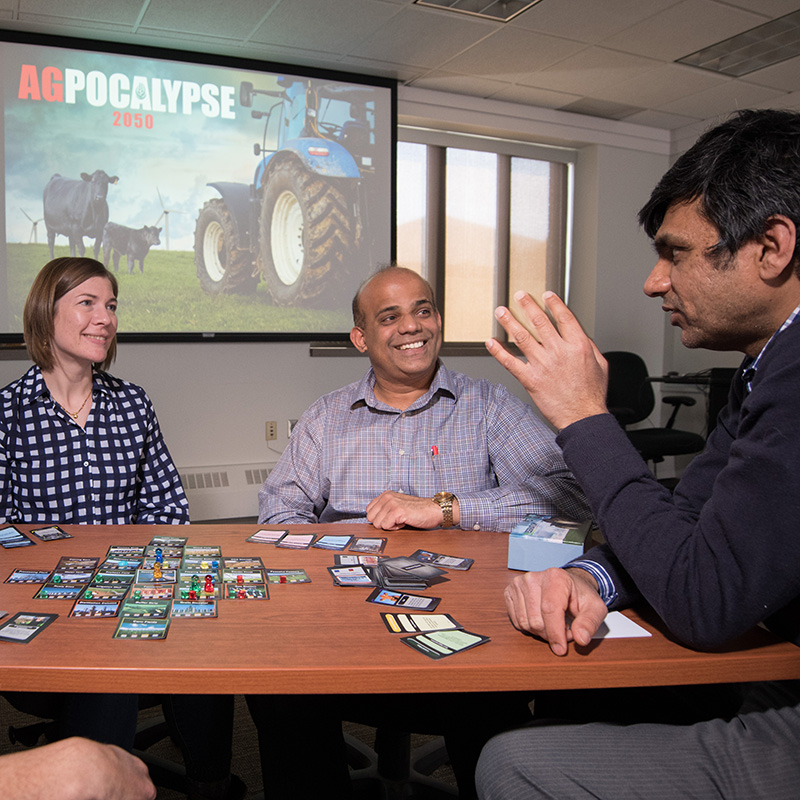
[this interview originally appeared in the IANR Strategic Discussions for Nebraska report]
GAME FOR MIDDLE SCHOOL AND HIGH SCHOOL STUDENTS PROMOTES LEARNING ABOUT AG DECISIONS AND PROCESSES
Interview with Ashu Guru, Jenny Keshwani and Jeyam Subbiah
By Katherine Mundorf
There’s a new video game in town – one that educators actually want students to play.
The "AgPocalypse" game helps students understand agriculture, natural resources and make decisions that affect outcomes of both. Jeyam Subbiah, Kenneth E. Morrison Distinguished Professor of Food Engineering, Biological Systems Engineering and Food Science and Technology, formed the game idea, then created a team of University of Nebraska–Lincoln colleagues to pull it all together.
COLLABORATORS
Assistant professors of biological systems engineering Ashu Guru and Jenny Keshwani, assistant professor Colleen Syron of the university’s School of Art, Art History and Design, recent university graduate Jacob Eiserman and students from the Raikes School of Computer Science and Management combined their diverse skills to create AgPocalypse 2050.
The game focuses on the corn, water, beef and ethanol systems in Nebraska, but Subbiah is hopeful that it can be expanded to other crops and livestock to match other states' and countries' agricultural practices. The game provides a scenario in which each player has a farm and must make decisions that affect the farm and its success.
SYSTEMS AND DECISIONS
Jenny Keshwani is in charge of the educational component of the game and makes sure the objectives for each level reflect the concept of systems thinking, which teaches students about cause and effect through agricultural systems.
"If a system changes, let’s say, how much I water my crops, it’s going to affect lots of things down the road," Keshwani explained. Throughout the game, students are given multiple opportunities to make decisions for their farm, like when to irrigate and what crop to plant. Students are given various models and resources to help influence their choice for the best possible outcome. This way, students from both urban and rural backgrounds have the knowledge necessary to be successful at this game.
CREATING THE GAME
Guru works with the game’s function, while Syron and her students are in charge of the graphic design and visual aspects of the video game.
"The best thing that came out of this project is the collaboration between the engineering students and the art students," Subbiah noted. Student Jacob Eiserman came up with the name AgPocalypse and helped guide the other students working on the graphics to be sure the game has visual appeal.
Guru is a teaching and learning specialist at the university. He guided the students creating the graphics with his experience of more than a decade in computer science and software development. Guru worked with the game platform and game logic associated with the game’s levels. Since the audience can range from middle school students to high school students to university undergraduate students, the video game has to be educational and challenging for all age groups.
"We are developing some board games which allow you to think strategically while physically interacting with the objects," Guru explained.
GAME LAUNCH
The game was launched during 4-H summer camps in the summer of 2018. The game will be more widely released by the summer of 2019. AgPocalypse also will be implemented into the curriculum for the Urban Agriculture and Natural Resources Academy at Omaha’s Bryan High School, which currently is the only agricultural program in the Omaha Public Schools district. Subbiah and the rest of the team hope that other schools will adopt the game into their curriculum so that urban students have the opportunity to learn more about agriculture and the decision-making process that farmers go through every day. The video game will start out online, but will be moved to a mobile app to make it easier for users to play.